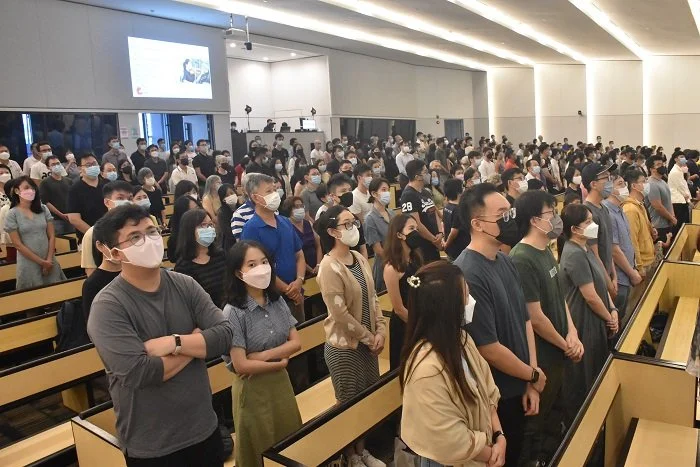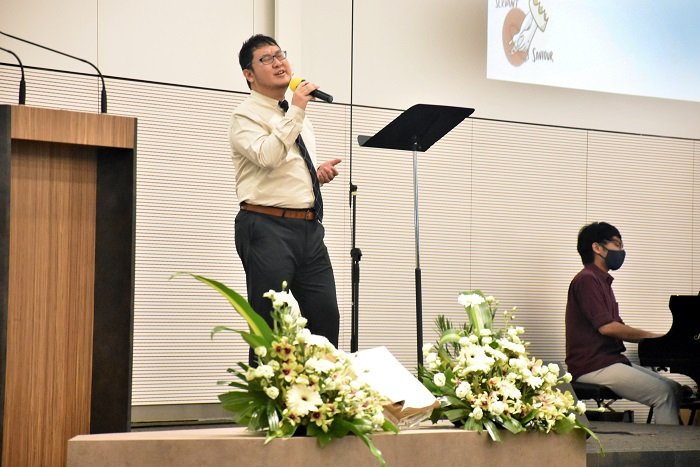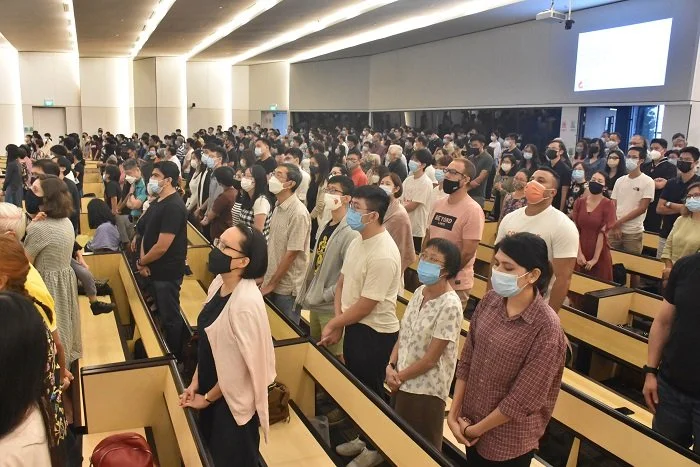When I Survey the Wondrous Cross (Good Friday 2022)
Neo Yi Ling reflects on last week's Good Friday service where we gathered to remember the death of Jesus on the cross.
It was the first Good Friday in two years since the pandemic where we could gather as a body of Christ and offer our voices unto the Lord in worship. Even though we were singing behind masks, the reverberation of voices was loud! It was wonderful to see the sanctuary filled up with members and guests.
Good Friday services in GBC are typically sombre events with mournful overtones as the church gathers to remember the death of Jesus on the cross. Toshi opened the service by singing the song "Gethsemane", with Aaron playing the piano and Esther on the violin.
To know each friend will fall away,
And heaven’s voice be still,
For hell to have its vengeful day
Upon Golgotha’s hill.
No words describe the Saviour’s plight
To be by God forsaken
Till wrath and love are satisfied,
And every sin is paid,
And every sin is paid.
– "Gethsemane" by Roger & Melanie Hoffman
Our worship leader singing the hymn "Gethsemane".
Pastor Mark Collins, who recently joined us as a member of the pastoral team, preached from Mark 15:16-39.
Ps Mark addressing the children in the congregation.
Mark 15:21 introduces Simon of Cyrene, who was likely on his way to Jerusalem for the Passover, when he was conscripted into carrying the cross for Jesus because Jesus had grown weary along the way. Simon’s sons – Alexander and Rufus – were mentioned in the passage. This might seem like an unimportant point; most probably they were people that the author Mark corroborated the details of events with after the death of Jesus. Ps Mark asked the children of the congregation to consider Alexander and Rufus’ perspectives – did they understand what Jesus came to do when He died on the cross, after hearing about the story from their Dad? Did Simon’s sons decide whether to believe in Jesus and follow Him as well?
Among those who surrounded Jesus before He died were those who mocked and sneered. Losing “face” is a common notion in Asian culture; it usually refers to being disrespected or mocked, something most people get angry or flare up at. What makes you feel disrespected, humiliated, shameful? How about being spat on, struck upon, and stripped? Mark describes how Jesus was mocked this way by the governor of the time (Pontius Pilate), the soldiers who tied him to the cross, the passersby, the chief priests and scribes, and even other criminals.
yet he opened not his mouth;
like a lamb that is led to the slaughter,
and like a sheep that before its shearers is silent,
so he opened not his mouth. (Isa 53:7)
Jesus’ non-retaliative behaviour demonstrated His determination to fulfil His Father’s plan.
Yet it was the will of the Lord to crush him;
he has put him to grief;
when his soul make an offering for guilt,
he shall see his offspring; he shall prolong his days;
the will of the Lord shall prosper in his hand.
Out of the anguish of his soul he shall see and be satisfied;
by his knowledge shall the righteous one, my servant,
make many to be accounted righteous,
and he shall bear their iniquities. (Isa 53:10-11)
The Bible author Mark indicates specific times of the day when things happened. At the “sixth hour” (which referred to noon time) – darkness covered the land (Mk 15:33), which was likely something akin to a solar eclipse. At the “ninth hour” (which referred to 3 pm) – Jesus called out to His God and expressed the agony of abandonment (Mk 15:34). Shortly after that was the event of death itself where Jesus “gave a loud cry and gave up his spirit” (Mk 15:37). There was darkness, dereliction, and death.
As a palliative care nurse who has witnessed the process of dying many times, it resonated with me when Ps Mark pointed out that people don’t normally give a loud cry just before their last breath. Often there is a slow, gradual progression towards the last breath, with changes in breathing patterns and a progressive loss of strength… towards the end, the dying person only has enough energy left to take shallow breaths through the mouth, not even enough to take a full breath that causes the chest to rise; much less give out a loud shout. The way Jesus died seemed to exhibit how He was in full control of the process and the timing. While the details paint the picture of a humiliating death, Jesus’ death itself seemed extraordinarily energetic and timely.
One of the frontline witnesses to Jesus’ death was so struck by how He died that what he saw led him to believe in God immediately. When the centurion, a battle-hardened soldier who had witnessed many deaths, “saw that in this way he breathed his last” (Mk 15:38,39), he was convinced that Jesus is truly the Son of God as he had claimed.
The sermon reminded me of Genesis 22 which we studied as a church a few weeks back. Abraham had prepared Isaac to be a sacrifice, out of obedience to God’s commands. Even when Isaac was tied up and Abraham had already prepared the stakes for fire, there was no struggle on Isaac’s part. Meanwhile, Abraham remained faithful, believing that “God would provide the sacrifice” in due time; or even if Isaac died, that he would be raised from the dead (Heb 11:17-19). God the Father did indeed provide the perfect sacrifice (Gen 22:13) on the very same mountain – His own Son who “knew no sin” but took on the sins of the world by dying in our place, so that we may be seen as righteous before God (2 Cor 5:21).
At the time of Jesus’ death, the curtain of the temple which separated the holy place from the most holy inner sanctum, was torn in two. Imagine, years and centuries of not being able to enter the most holy of places because one’s presence alone would defile it – this barrier, abolished in an instant! Jesus’ death paved the way to reconciliation between a holy God and sinful man.
Here on the cross was the man who had performed many miracles including healing the sick (Mk 2:10), commanding nature (Mk 4:39), casting out demons (Mk 5:8), and raising people from the dead (Jn 11:1-44). He had generated a large following willing to learn from Him and call Him Lord and King. The man whom many Jews expected to be the one to lead them out of Roman oppression; the true Son of Man who is the Son of God. Why did the king of the universe allow Himself to be mocked? That was the question we were called to reflect upon at the start of the service. The words from the song "What Love, My God" answer the question well:
What love my God would send the Way of Life
To walk the road, rejected and despised
That You might know the weakness I possess
And be my rock of strength and righteousness
What love my God could hold You to the tree
To bear that overwhelming debt for me
The Son of heaven leaves the Father's side
The Healer bleeds, the Life was made to die
O Your love my God like a flood
As heaven opened up pouring out on us
O praise the King who came to the world
In His love like a mighty flood
– Excerpt from "What Love, My God" by CityAlight
The Good Friday service ended with the congregation partaking of the communion together.
It may seem strange for Christians to commemorate what seemed like a humiliating death of the King they worship, and perhaps, even unnecessarily morbid. The mocking death that Jesus underwent purchased for us freedom – from sin, from the fear of losing face, from the fear of death. In gathering to remember Jesus’ death, we remember the work He did for us on the cross, and the new life we now have in Jesus!
Taking part in the communion, we look back to remember what Jesus has done for us, and look forward to what is to come…
GBC singing of God’s love and praising the King who came to the world.
---
Pictures from the services are available on our Facebook page and you can also watch the Good Friday service here:






